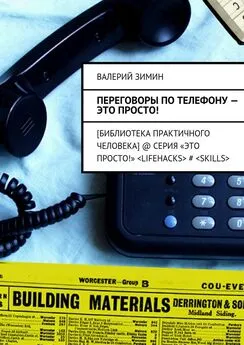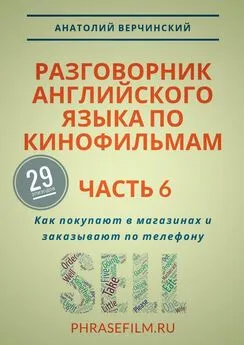Т. Шелкова - Как вести беседу по телефону
- Название:Как вести беседу по телефону
- Автор:
- Жанр:
- Издательство:Высшая школа
- Год:1989
- Город:М.
- ISBN:5-06-001624-2
- Рейтинг:
- Избранное:Добавить в избранное
-
Отзывы:
-
Ваша оценка:
Т. Шелкова - Как вести беседу по телефону краткое содержание
Ведение разговора по телефону на иностранном языке требует от обучающегося определенных навыков понимания, восприятия и удержания в памяти услышанного, а также незамедлительной словесной реакции на услышанное. Недостаточное развитие этих навыков является препятствием к тому, чтобы хорошо и уверенно говорить по телефону.
Пособие ставит своей целью помочь учащимся овладеть навыками беседы по телефону, пользоваться общепринятой терминологией.
Во второе издание (1-е — 1980 г.) внесены исправления редакционного характера.
Для лиц, самостоятельно совершенствующих свои знания английского языка.
Как вести беседу по телефону - читать онлайн бесплатно полную версию (весь текст целиком)
Интервал:
Закладка:
Fred: Thank you, Yuri. I’m sure your help will improve things.
Yuri: See you on Monday, Freddy. Good-bye.
Fred: Thanks again, Yuri. Good-bye.
Mr Serov: Mr Budd? Good afternoon. This is Serov speaking.
Mr Budd: Hello, Mr Serov. Nice to hear you. How’s everything?
Mr Serov: Fine, thank you. You know, this Friday our Dynamo team is playing against your Red Sox.
Mr Budd: Are they really? That’s great! They are my favourite teams and I don’t know who to root for.
Mr Serov: I have two tickets. Would you like to watch the match?
Mr Budd: Sure thing. This is the only chance, and I would not miss it. And what’s your favourite sport?
Mr Serov: It’s hard to say. I like soccer all right, but I think I like tennis better.
Mr Budd: Do you play much tennis?
Mr SeroV: Yes, quite a bit. How about a game sometime?
Mr Budd: No, thanks. I am strictly a spectator.
Mr Serov: So I’m sending you the tickets for the match and hope to see you on Tuesday.
Mr Budd: Thank you, Mr Serov. I’m looking forward to seeing you. Goodbye.
Mr Serov: Good-bye.
I. Read these dialogues and reproduce them as close to the text as possible.
II. What would you say on the phone in reply to these remarks or questions?
1. I suppose, that if we weigh the “pros” and “cons” we can make a more equitable assessment of the proposal. 2. Mr Orlov, I think, made a pertinent remark during the debate. 3. If you take an overall view of things I’m sure you’ll change your opinion. 4. I like the way Peter conducted the proceedings. He kept all the discussion to the point. 5. I wouldn’t say that the speaker explicitly spelled out what he had in mind. 6. Mr Breddy is away from the office on sick leave. Is there any message? 7. I think he is making wonderful progress in English. 8. Your argument turned the scale in my favour in our dispute. 9. Why do you think, Mr Omar, the staff at your office is in constant state of flux?
III. In what situations would you say the following?
1. I don’t know which team to root for. 2. Their choice fell on me because I’m a bachelor. 3. Could you fix an alternative date for meeting? 4. I’ll leave the invitation as an open one until a little later. 5. We are anxious to make whatever arrangements are convenient to you for spending a day or two in visiting our factory. 6. Then I’ve got to think about a present. 7. This is the only outstanding question. It should be brought up again tomorrow. 8. This is a very persuasive argument. You should have mentioned it. 9. I’m terribly sorry. I can’t disturb him. He is in conference.
IV. Discuss over the phone with a friend of yours:
1. the film you have seen; 2. the book you have read; 3. the performance you have seen; 4. the conference you have attended; 5. the holiday you had in summer; 6. the invitation to a wedding party you have received; 7. your favourite sport; 8. the party you have been to.
Working in groups of two, read the two dialogues aloud.
After having an interesting tour around the Capitol, this seat of US legislation, a tourist group of foreign students surrounded their American guide, who is a member of the House Foreign Affairs Committee. They poured a forest of questions upon him.
Tourist A: We are foreigners, Sir, and do not know much either about the Congress or the State Department. Do you mind if we ask you some questions?
Guide: Of course not. Go ahead. What is it that you’d like to know?
Tourist B: Does the Congress take part in US foreign policy formulation?
Guide: Very much so. The US participation in world affairs since World War II has greatly expanded the role of the Congress in foreign policymaking.
Tourist C: We thought that this was the competence of the State Department.
Guide: This is what the foreigners usually think. The President is the central figure of American foreign policy, and the final responsibility is his.
Tourist D: And the State Secretary’s?
Guide: While the President makes the most critical decisions, he cannot possibly attend to all matters affecting international relations. The Secretary of State, the first-ranking member of the Cabinet, is at the same time the President’s principal adviser in formulating foreign policy.
Tourist A: What are the problems requiring the attention of the Secretary?
Guide: They are manifold — from maintaining country’s security to rescuing an individual American who got in serious trouble in some remoted area of the world.
Tourist B: And where does the Congress come into picture?
Guide: To begin with, none of this country’s far-reaching, programs — participation in the United Nations, economic, technical and military assistance — would have been possible without congressional action.
Tourist C: The annual appropriations of funds for enormous military build up, I presume, need congressional approval, too?
Guide: Absolutely so, but only on the recommendations of the Armed Services and Appropriations Committees of both Houses.
Tourist D: Who are the members of numerous House and Senate Committees?
Guide: They are usually experienced and authoritative members of Congress with long service. Their inspections abroad and participation in US delegations to the UN General Assembly and to many other international conferences give them firsthand experience with US foreign problems.
Tourist A: Who informs the members of Congress on the current foreign policy issues?
Guide: The Secretary of State does. He meets regularly with the members of Senate and House Committees and brief s them on a broad range of foreign policy matters. They are kept well-informed of the international developments affecting this country.
Tourist B: Does the State Department provide these bodies with comprehensive reports on US foreign policy?
Guide: To further facilitate the relationship with the Congress, the Secretary of State annually provides the Committees with a comprehensive report on US Foreign Policy.
Tourist D: Any other channels of communication with the Congress?
Guide: Yes, a constant and substantial interchange of views between the members of the Congress and the Department goes on through the Assistant Secretary for Congressional Relations.
Tourist D: Very well, Sir. On behalf of the foreign students I should like to thank you for a very interesting and detailed talk on the congressional participation in foreign policymaking.
a critical decisionрешение по важному, не терпящему отлагательств вопросу
to attend to mattersуделять внимание вопросам
the first-ranking member of the Cabinetчлен кабинета, занимающий наиболее высокое положение
manifold а многочисленный, разнообразный
rescue v спасать, оказывать помощь
annual appropriationsгодовые ассигнования
military build upнаращивание военных сил
numerous a многочисленный
firsthand experienceличный опыт
G. MISCELLANEA
Mr Stogov: Hello, is that Parson’s Garage?
Telephone Voice: Yes, this is Fred Parson.
Mr Stogov: Good. This is Stogov. What I wanted to say, was that I can’t quite understand why you have sent me another bill for ₤25, considering that I’ve paid this bill already. I think it was at least four weeks ago.
Telephone Voice: Oh, sorry about that. You see, we’ve got a new girl in the office and she hasn’t quite got the hang of things yet. Just ignore it, will you? Sorry to have caused you this inconvenience. It won’t happen again, — at least, I hope not.
Mr Stogov: So do I. Good afternoon.
Mr Saveliev: Could I speak to Mr Abbott, please?
Mr Abbott: Speaking.
Mr Saveliev: Good morning, Mr Abbott. This is Saveliev.
Mr Abbott: Good morning, Mr Saveliev. I am glad to hear from you. How are you?
Mr Saveliev: Fine, and you, Jack?
Mr Abbott: I am fine, too.
Mr Saveliev: Thank you for the birthday card and the champagne. The card gave me as much pleasure as the wine.
Mr Abbott: How was it, good?
Mr Saveliev: It’s the best champagne I have ever had. You certainly hit the spot [16] to hit the spot Am. попасть в точку, угодить
with your gift. We missed both of you at the birthday party.
Mr Abbott: It’s a pity Alice and I could not come. But you know the reason.
Mr Saveliev: Yes, I do. We drank to your health. I hope you’ll come to my wife’s birthday party this spring.
Mr Abbott: Of course, we’ll be happy to. Best regards to Irene.
Mr Saveliev: Thank you. Say hello to Alice, please.
Mr Abbott: I will, good-bye.
Mr Saveliev: Good-bye.
Mr Butov: Hello. May I speak to Mr Frost, please?
Secretary: Just a moment. Mr Frost, it’s for you.
Mr Frost: Hello, who’s speaking?
Mr Butov: This is Mr Butov.
Mr Frost: Good afternoon, Mr Butov. I haven’t heard from you since October.
Mr Butov: I had the flu for a couple of weeks, but I’m fine now.
Mr Frost: I’m glad to hear that. We did have a spell of bad weather.
Mr Butov: By the way, did you hear what happened to Fred Jackson?
Mr Frost: No, what about him?
Mr Butov: He has had such a bad case in the flu that they’ve taken him to the hospital.
Mr Frost: I am sorry to hear that. Poor fellow, he won’t be able to attend the session of the Assembly, then.
Mr Butov: I’m afraid not. And what about you, Mr Frost? Will you be present at the session?
Mr Frost: Unless I get ill.
Mr Butov: I hope you won’t. See you on Tuesday. Good-bye.
Mr Frost: Good-bye, Mr Butov.
Operator: Hello. Supermarket. Can I help you?
Mr Petrov: Hello. This is Petrov speaking. I’d like you to send me some things, please.
Operator: I’ll put you through to the Deliveries Department.
Mr Petrov: Thank you.
Deliveries Department: Good morning. Deliveries.
Читать дальшеИнтервал:
Закладка:










